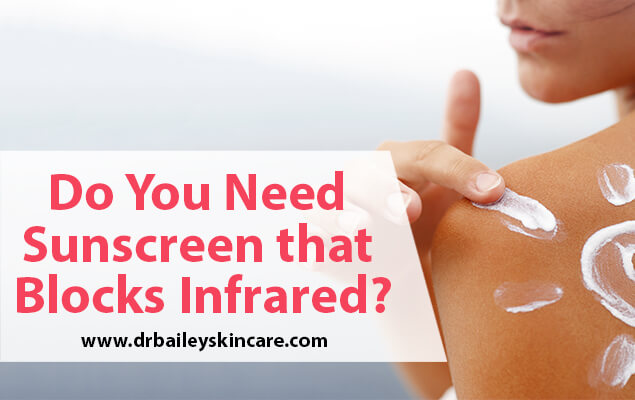Do You Need Sunscreen that Blocks Infrared?

Do you need sunscreen that blocks infrared waves? Some scientific studies have suggested that infrared rays are damaging and aging to human skin. And sunscreen skin care companies have rushed to create a new market niche and product advantage by claiming to block IR. Is it necessary?
The truth about protecting your skin from the sun’s rays.
Better scientific studies actually prove that infrared radiation from the sun is not harmful to skin and is in fact beneficial.
The devil is in the scientific details for the studies. Those studies suggesting infrared radiation is harmful to skin were poorly constructed for anyone wanting to make conclusions about real-life exposure to infrared radiation from the sun. Infrared radiation from the sun may, in fact, help protect skin and heal skin from UV damage.
I have to add this to my list of #sillyskincare claims and I can thank Camila who sent me the question via my Facebook Live broadcast. Thank you Camila.
- So, what’s up with the infrared radiation and skin sun damage controversy?
- Are the new products and the claims the work of real experts in photobiology?
Over 54% of the sun’s radiation is infrared radiation. This could sound really bad for skin. But the studies done that suggest infrared rays damage skin were done with lamps that in no way simulate sun infrared radiation and/or done on cell and tissue cultures in the lab and not on the skin of living humans. These studies suggest that infrared radiation can create free radicals and are bad for skin. But.....
 Respected experts in photobiology have taken on the infrared controversy. They list and analyze study after study on infrared and skin photobiology. And they demonstrate that those studies suggesting that there are deleterious effects of infrared radiation on skin were fundamentally flawed. In fact, infrared radiation from the sun is known to actually help skin survive UV exposure and heal overexposure. - Dermatologist Dr. Cynthia Bailey
Respected experts in photobiology have taken on the infrared controversy. They list and analyze study after study on infrared and skin photobiology. And they demonstrate that those studies suggesting that there are deleterious effects of infrared radiation on skin were fundamentally flawed. In fact, infrared radiation from the sun is known to actually help skin survive UV exposure and heal overexposure. - Dermatologist Dr. Cynthia Bailey
Is infrared protection good for your skin?
Not necessarily. For years, we have used infrared to rejuvenate skin and speed wound healing. Expert photobiologists state:
“The effects of visible & NIR wavelengths are dose-dependent. This is analogous to the beneficial long-term health effect of drinking a glass of red wine a day as opposed to the detrimental effect of drinking a whole bottle a day once a week.”
They go on to conclude:
“Photobiomodulation exposure to visible and IR-A light which emulates the conditions of natural sunlight in wavelength, intensity, and dosage can be beneficial to the skin. Such light exposure might even pre-condition the skin, preparing it for upcoming (mid-day zenithal) UVR insults. On the other hand, exposure to artificial IR-A radiation of too broad of a range and intensity/dose can contribute to existing detrimental effects or cause negative effects of its own (increased MMP-1).”
My conclusion as a dermatologist who has specialized in skin cancer and skin sun damage for over 30+ years.
Ignore the chatter about infrared. Ignore the sunscreens which claim to block infrared.
Focus on protecting your skin from UVA and UVB by using a broad spectrum sunscreen and physically keeping the sun off of your skin with clothing, a hat and shade. Yes, wear UPF 50 clothing and a sun hat when outdoors. Head for the shade or create it. Apply mineral zinc oxide based sunscreen to exposed skin not covered by UV-blocking clothing. There is no controversy with these recommendations and your skin will look great and stay strong for your lifetime if you protect it from UV exposure.
We clearly know that UVA and UVB damage skin, lead to skin cancer and skin immune suppression. In addition, my opinion after watching the science for 25+ years, is that mineral zinc oxide sunscreens are the best and most trustworthy. Click here to see the zinc oxide sunscreens and sun protection tools that I rely on for myself, my family and my patients.
 Visible light is another story. It may lead to increased pigment problems such as melasma. We now are recommending sunscreen with iron oxide as well as SPF 30+ Broad Spectrum protection to block visible light along with UV rays. My top choice that I wear on my face daily is my Sheer Strength Pure Physical Matte Tinted SPF 30+ Sunscreen.
Visible light is another story. It may lead to increased pigment problems such as melasma. We now are recommending sunscreen with iron oxide as well as SPF 30+ Broad Spectrum protection to block visible light along with UV rays. My top choice that I wear on my face daily is my Sheer Strength Pure Physical Matte Tinted SPF 30+ Sunscreen.
If you would like to enjoy the light reading of these true experts in photobiology as they address the infrared controversy, I refer you to https://www.ncbi.nlm.nih.gov/pmc/articles/PMC4745411/
If you found this interesting and would like to get your skin health info straight from a Board Certified Dermatologist, I invite you to sign up for my free eNewsletter here.
Reference:
Daniel Barolet, François Christiaens, and Michael R Hamblin, Infrared and Skin: Friend or Foe, J Photochem Photobiol B. J Photochem Photobiol B. 2016 Feb; 155: 78–85.
Laura Hudson Eyman Rashdan Catherine A. Bonn Bhaven Chavan David Rawlings Mark A. Birch‐Machin, Individual and combined effects of the infrared, visible, and ultraviolet light components of solar radiation on damage biomarkers in human skin cells, The FASEB Journal, Volume34, Issue3, March 2020, 3874-3883 https://doi.org/10.1096/fj.201902351RR
Lee JH, Roh MR, Lee KH. Effects of infrared radiation on skin photo-aging and pigmentation. Yonsei Med J. 2006;47(4):485–490. doi:10.3349/ymj.2006.47.4.485
